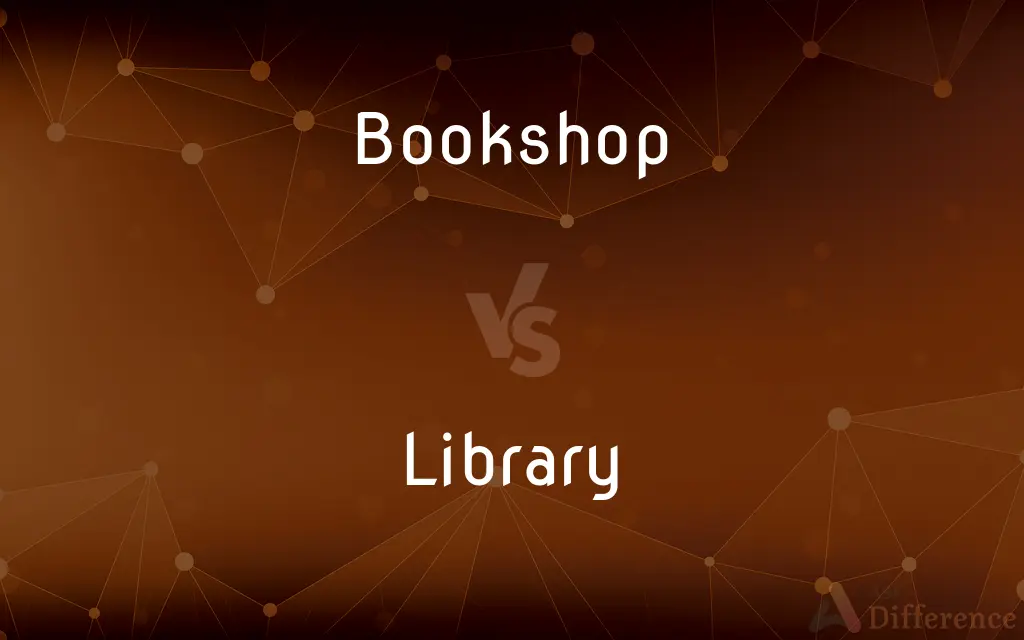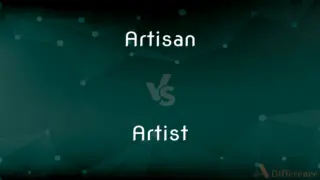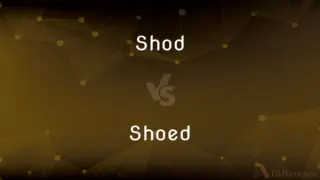Bookshop vs. Library — What's the Difference?
Edited by Tayyaba Rehman — By Fiza Rafique — Updated on October 27, 2023
A Bookshop is a store selling books; a Library is an institution lending books for temporary use.

Difference Between Bookshop and Library
Table of Contents
ADVERTISEMENT
Key Differences
A Bookshop is essentially a commercial establishment where books are bought and sold. Customers walk into a Bookshop with the intention of purchasing a book or other reading materials, typically paying the retail price. On the other hand, a Library is a place where books and other informational materials are stored for public use.
Unlike a Bookshop, a Library does not sell books but lends them to patrons for a specific period. While Bookshops focus on the sale of new or used books, Libraries serve as repositories of knowledge, offering access to vast collections without the need for purchase.
Both Bookshops and Libraries play vital roles in promoting literacy and reading; however, their primary functions differ significantly.
Comparison Chart
Primary Purpose
Selling books
Lending books
Ownership
Typically private enterprises
Often public or institutional
ADVERTISEMENT
Cost to the User
Books are purchased
Free access, though late fees may apply
New vs. Used
Sells new and/or used books
Collection can include both new and old
Duration of Possession
Permanent ownership after purchase
Temporary loan period
Compare with Definitions
Bookshop
Provides books for permanent ownership.
After buying a book at the Bookshop, it's yours to keep.
Library
Often publicly funded and accessible.
The town's public Library offers free access to all residents.
Bookshop
A commercial place for purchasing reading materials.
The downtown Bookshop offers a discount every weekend.
Library
A repository of books, magazines, and other media.
The city's Library has an extensive collection of historical documents.
Bookshop
Often carries new releases and bestsellers.
I found a signed copy of my favorite author's new book at the Bookshop.
Library
A library is a collection of materials, books or media that are easily accessible for use and not just for display purposes. It is responsible for housing updated information in order to meet the user's needs on a daily basis.
Bookshop
Can be specialized or general in its offerings.
The niche Bookshop only sells science fiction and fantasy titles.
Library
Provides access to knowledge and information.
Students often use the Library for research and study.
Bookshop
A store that sells books.
She visited the Bookshop to buy the latest bestseller.
Library
A building or room containing collections of books, periodicals, and sometimes films and recorded music for use or borrowing by the public or the members of an institution
A library book
A university library
Bookshop
A shop where books are sold.
Library
A place in which reading materials, such as books, periodicals, and newspapers, and often other materials such as musical and video recordings, are kept for use or lending.
Bookshop
A bookstore.
Library
A collection of such materials, especially when systematically arranged.
Bookshop
A shop that sells books.
Library
A room in a private home for such a collection.
Bookshop
A bookseller's shop.
Library
An institution or foundation maintaining such a collection.
Bookshop
A shop where books are sold
Library
A series of books issued by a publisher.
Library
A collection of standard routines used in computer programs, usually stored as an executable file.
Library
A collection of cloned DNA sequences whose location and identity can be established by mapping the genome of a particular organism.
Library
A collection of proteins generated from the collected DNA sequences that express them, used for tracking metabolic functions of proteins in diseases such as cancer, for the synthesis of new drugs, and for other proteomics research.
Library
An institution which holds books and/or other forms of media for use by the public or qualified people often lending them out, as well as providing various other services for its users.
Library
(by extension) Any institution that lends out its goods for use by the public or a community.
Library
A collection of books or other forms of stored information.
Library
An equivalent collection of analogous information in a non-printed form, e.g. record library.
Library
A room dedicated to storing books.
Library
(computer programming) A collection of software routines that provide functionality to be incorporated into or used by a computer program.
Library
(genetics) A collection of DNA material from a single organism or relative to a single disease.
Library
(card games) The deck or draw pile.
Library
A considerable collection of books kept for use, and not as merchandise; as, a private library; a public library.
Library
A building or apartment appropriated for holding such a collection of books.
Library
A room where books are kept;
They had brandy in the library
Library
A collection of literary documents or records kept for reference or borrowing
Library
A depository built to contain books and other materials for reading and study
Library
(computing) a collection of standard programs and subroutines that are stored and available for immediate use
Library
A building that houses a collection of books and other materials
Library
An institution that lends books for temporary use.
He borrowed a novel from the Library for two weeks.
Library
May charge fees for late returns or special services.
I had to pay a late fee at the Library for an overdue book.
Common Curiosities
What is the primary function of a Bookshop?
The primary function of a Bookshop is to sell books to customers.
Can I own a book from a Library?
No, Libraries lend books for temporary use, and they need to be returned.
How does a Library typically acquire its books?
Libraries often acquire books through purchases, donations, or inter-library loans.
Are all Bookshops for-profit?
While many Bookshops are for-profit, some, like certain indie Bookshops, may prioritize community engagement.
Do Libraries only contain books?
No, Libraries can also have magazines, digital media, audiobooks, and other resources.
Can digital books be found in Libraries?
Yes, many Libraries offer e-books and digital resources for patrons.
Are Bookshops always independent entities?
No, some Bookshops are part of larger chains or franchises.
How do Bookshops determine their book prices?
Bookshops consider factors like publisher's cost, market demand, and overhead expenses.
Do Bookshops offer only new books?
No, some Bookshops, especially used Bookshops, sell pre-owned books.
Are there membership fees in Libraries?
Public Libraries typically offer free memberships, but some specialized Libraries may have fees.
Do Libraries sell books?
Some Libraries have sales for surplus or old books, but their primary function is lending.
How do Bookshops support authors?
Bookshops often host book signings, launch events, and promote authors' works.
Can I request a specific book at a Library?
Yes, many Libraries take requests or have inter-library loan systems to obtain specific titles.
How do Bookshops and Libraries promote literacy?
Bookshops often host author events and book clubs, while Libraries offer reading programs and workshops.
Can one donate books to a Library?
Yes, many Libraries accept book donations, though they might have specific criteria.
Share Your Discovery

Previous Comparison
Artisan vs. Artist
Next Comparison
Shod vs. ShoedAuthor Spotlight
Written by
Fiza RafiqueFiza Rafique is a skilled content writer at AskDifference.com, where she meticulously refines and enhances written pieces. Drawing from her vast editorial expertise, Fiza ensures clarity, accuracy, and precision in every article. Passionate about language, she continually seeks to elevate the quality of content for readers worldwide.
Edited by
Tayyaba RehmanTayyaba Rehman is a distinguished writer, currently serving as a primary contributor to askdifference.com. As a researcher in semantics and etymology, Tayyaba's passion for the complexity of languages and their distinctions has found a perfect home on the platform. Tayyaba delves into the intricacies of language, distinguishing between commonly confused words and phrases, thereby providing clarity for readers worldwide.
















































